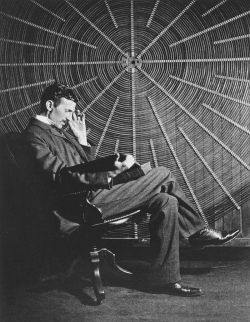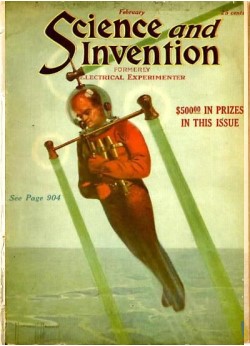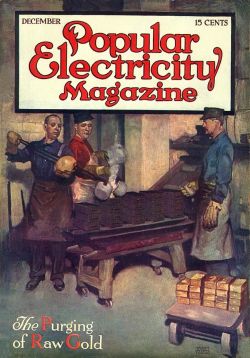 In one study, scientists at McGill University in Canada used eye-tracking technology to study which news articles volunteers paid most attention to. They found that people often chose stories about negative criticism in preference to positive or neutral stories. They concluded that people in general are more interested in inappropriate, offensive, or controversial news, and yet when asked, they would say they preferred the pleasant news.
In one study, scientists at McGill University in Canada used eye-tracking technology to study which news articles volunteers paid most attention to. They found that people often chose stories about negative criticism in preference to positive or neutral stories. They concluded that people in general are more interested in inappropriate, offensive, or controversial news, and yet when asked, they would say they preferred the pleasant news.
Negativity and controversy have fueled the demand of three periodical publications in which Nikola Tesla expressed his ideas. Tesla became well known as an inventor, and demonstrated his achievements to celebrities and wealthy patrons at his lab. He was noted for his showmanship at public lectures. It is not surprising that publications of his works and discoveries have been very popular with science collectors since the beginning of last century. But, it is the content of his most controversial theories that have been extremely difficult to purchase or even locate at any book dealer, auction house or library. Here are three examples:
 Tesla throughout his life sought a technological way to end warfare. On July 11, 1934, the New York Times reported that an invention by Tesla “will send concentrated beams of particles through the free air, of such tremendous energy that they will bring down a fleet of 10,000 enemy airplanes at a distance of 250 miles…” The only serious interest for Tesla’s “Death Ray” invention came from the Soviet Union. More than a decade earlier in true sci-fi fashion, Tesla’s vision of a futuristic war between machines appeared in the February 1922 Science and Invention issue with illustrations by Paul Frank. A copy with the front cover detached sold at a Heritage auction, on December 2, 2020, for $900.00.
Tesla throughout his life sought a technological way to end warfare. On July 11, 1934, the New York Times reported that an invention by Tesla “will send concentrated beams of particles through the free air, of such tremendous energy that they will bring down a fleet of 10,000 enemy airplanes at a distance of 250 miles…” The only serious interest for Tesla’s “Death Ray” invention came from the Soviet Union. More than a decade earlier in true sci-fi fashion, Tesla’s vision of a futuristic war between machines appeared in the February 1922 Science and Invention issue with illustrations by Paul Frank. A copy with the front cover detached sold at a Heritage auction, on December 2, 2020, for $900.00.
In 1912, Tesla theorized a plan to make dull students transformed from dunces into star pupils by saturating them unconsciously with electricity. He conceived the idea that wiring the walls of a schoolroom with invisible electrical currents using the Tesla electric coil, which vibrates at high frequency, would convert the area into a health-giving, stimulating electromagnetic field. The article, which appeared in the December 1912, issue of Popular Electricity Magazine, had the approval of the then superintendent of New York City schools, William H. Maxwell.
 The February 9, 1935, issue of Liberty magazine includes among some of Tesla’s futuristic predictions, his disturbing vision on imposed selective breeding. A segment of his article describing a version of eugenics through forced sterilization of criminals and the mentally ill is reprinted here:
The February 9, 1935, issue of Liberty magazine includes among some of Tesla’s futuristic predictions, his disturbing vision on imposed selective breeding. A segment of his article describing a version of eugenics through forced sterilization of criminals and the mentally ill is reprinted here:
“The year 2100 will see eugenics universally established. In past ages, the law governing the survival of the fittest roughly weeded out the less desirable strains. Then man’s new sense of pity began to interfere with the ruthless workings of nature. As a result, we continue to keep alive and to breed the unfit. The only method compatible with our notions of civilization and the race is to prevent the breeding of the unfit by sterilization and the deliberate guidance of the mating instinct. Several European countries and a number of states of the American Union sterilize the criminal and the insane. This is not sufficient. The trend of opinion among eugenists is that we must make marriage more difficult. Certainly no one who is not a desirable parent should be permitted to produce progeny. A century from now it will no more occur to a normal person to mate with a person eugenically unfit than to marry a habitual criminal.”
Nikola Tesla’s personal library, now at the Nikola Tesla Museum, consists of 975 titles (in 1,172 copies), monographs (books) and 2,435 individual issues of 347 periodical titles (magazines and news-papers). The journals referenced here are not included in the collection. Dealers worldwide have no copies for sale. Special collections at institutional libraries are also missing the issues of Popular Electricity magazine December 1912, Science and Invention February 1922, and Liberty magazine February 9, 1935. Please let us know if you own one.

{ 0 comments… add one now }